Books on consciousness
A list of books relating to the hard problem of consciousness. Regularly updated cos I keep finding new stuff all the time.
A list of books relating to the hard problem of consciousness. Regularly updated cos I keep finding new stuff all the time.
2000
 William Lane Craig
William Lane Craig
The Tensed Theory of Time: A Critical Examination
(Kluwer 2000)
This book and its companion, The Tenseless Theory of Time, are an attempt to adjudicate what is possibly the most fundamental question in the philosophy of time, namely, whether a static or a dynamic conception of the world is correct. In these two complementary but independent volumes, Craig examines the most important arguments for and against each theory. See Springer | Amazon | Google
 William Lane Craig
William Lane Craig
The Tenseless Theory of Time: A Critical Examination
(Kluwer 2000)
This book and its companion, The Tensed Theory of Time, are an attempt to adjudicate what is possibly the most fundamental question in the philosophy of time, namely, whether a static or a dynamic conception of the world is correct. In these two complementary but independent volumes, Craig examines the most important arguments for and against each theory. See Springer | Amazon | Google
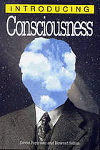 David Papineau & Howard Selina
David Papineau & Howard Selina
Introducing Consciousness: A Graphic Guide
(Icon 2000)
A comprehensive guide to the current state of consciousness studies. It starts with the history of the philosophical relation between mind and matter, and proceeds to scientific attempts to explain consciousness in terms of neural mechanisms and quantum mechanics. Readers are also introduced to zombies and Chinese Rooms, ghosts in machines and Schrodinger’s cat. See Icon | Amazon | Google
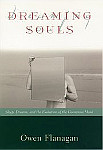 Owen Flanagan
Owen Flanagan
Dreaming Souls: Sleep, Dreams, and the Evolution of the Conscious Mind
(Oxford 2000)
Flanagan argues that while sleep has a clear biological function and adaptive value, dreams are merely side effects, ‘free-riders,’ irrelevant from an evolutionary point of view. But dreams are hardly unimportant: they are self-expressive, the result of our need to find or create meaning, even when sleeping. Brainstem activity during sleep generates a jumbled profusion of memories, images, thoughts, emotions, and desires, which the cerebral cortex then attempts to shape into a more or less coherent story. However bizarre these narratives may be, they shed light on our mental life, our well being, and our sense of self. See Oxford | Amazon | Google
 Jon E Roeckelein
Jon E Roeckelein
The Concept of Time in Psychology: A Resource Book and Annotated Bibliography
(Greenwood 2000)
The methodologies used to study psychological time, especially the experimental and empirical approaches, are critically important in the scientific analysis of the concept of time. This resource and annotated bibliography provides a current and comprehensive review of the literature on psychological time, and traces the evolution of the concept of time in psychology from ancient to modern periods. See Greenwood | Amazon | Google
 John W. Yolton
John W. Yolton
Realism and Appearances: An Essay in Ontology
(Cambridge 2000)
This book addresses one of the fundamental topics in philosophy: the relation between appearance and reality. Yolton draws on a rich combination of historical and contemporary material, ranging from the early modern period to present-day debates, to examine this central philosophical preoccupation, which he presents in terms of distinctions between phenomena and causes, causes and meaning, and persons and man. See Cambridge | Amazon | Google
 Steven Davis (ed.)
Steven Davis (ed.)
Color Perception: Philosophical, Psychological, Artistic, and Computational Perspectives
(Oxford 2000)
Color has been studied for centuries, but remains incompletely understood. The fact that color is a quality of perception rather than a "physical quality" brings up a host of interesting questions and makes it of common interest to both artists and scholars. This highly interdisciplinary volume - the ninth in the Vancouver Studies in Cognitive Science series - brings together chapters by psychologists, philosophers, computer scientists, and artists to explore the nature of human color perception, and hopes to further our understanding of color by encouraging interdisciplinary interaction. See Amazon | Google
 Peter Goldie
Peter Goldie
The Emotions: A Philosophical Exploration
(Oxford 2000)
Goldie illuminates the phenomena of emotion by drawing on philosophy, literature and science. He considers the roles of culture and evolution in the development of our emotional capabilities, and examines their links to mood and character. He also places the emotions in the context of consciousness, thought, feeling, and imagination. He explains how we can make sense of our own and other people's emotions, and how we can explain the very human things which emotions lead us to do. See Oxford | Amazon | Google
 Joseph S. Catalano
Joseph S. Catalano
Thinking Matter: Consciousness from Aristotle to Putnam and Sartre
(Routledge 2000)
While many contemporary philosophers downplay the significance of the body and subscribe to a brain/body dualism in consciousness, Catalano argues that it is the “entire” fleshy body that thinks; the body of the dancer and the hands of the writer are not merely instruments of thought, but forms of thought itself. Calling for a rethinking of philosophic traditions from Aristotle to Sartre, Catalano offers a holistic view of the bodily nature of consciousness, focusing on the total organic body than just the brain alone. See Routledge | Google
 Barry Dainton
Barry Dainton
Stream of Consciousness
(Routledge 2000)
While the recent upsurge of interest in consciousness has focused on the relationship between consciousness and the brain, questions concerning the fundamental characteristics of consciousness itself have received less attention. Dainton presents a phenomenological inquiry into the most general features of conscious life: the nature of awareness, introspection, space and time-consciousness. He shows us that a stream of consciousness is not a mosiac of discrete fragments but an interconnected flowing whole. See Routledge | Google
 Susan Greenfield
Susan Greenfield
The Private Life of the Brain
(Wiley 2000)
Greenfield examines the physical basis of our emotions and searches for the answer to one of the most enduring mysteries in science – how does the brain create a unique, subjective experience for each one of us? Utilizing cutting-edge research and compelling personal anecdotes, Greenfield reveals that emotions, triggered by individual life experiences, are the very foundation upon which our brains build our unique minds. See Wiley | Google | Amazon
 Tim Crane & Sarah Patterson (eds.)
Tim Crane & Sarah Patterson (eds.)
History of the Mind-Body Problem
(Routledge 2000)
A collection of new essays on the various concerns that have given rise to and informed the mind-body problem in philosophy. The essays in this collection discuss famous philosophers such as Aristotle, Aquinas and Descartes and cover the subjects of the origins of qualia and intentionality. See Routledge | Google
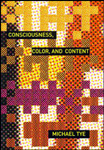 Michael Tye
Michael Tye
Consciousness, Color and Content
(MIT 2000)
In 1995 Michael Tye proposed a theory of phenomenal consciousness now known as representationalism. This book is, in part, devoted to a further development of that theory along with replies to common objections. See MIT Press | Amazon | Google Books
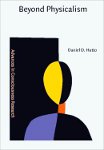 Daniel D. Hutto
Daniel D. Hutto
Beyond Physicalism
(John Benjamins 2000)
Unlike standard attempts to address the problem of consciousness, which assume our understanding of consciousness is unproblematic, this book focuses on phenomenology and clarifies the relations between intentionality, propositional content and experience. It argues that consciousness cannot be understood in representationalist terms, and that the metaphysical problem is a product of the misguided attempt to fit consciousness within an object-based schema. A similar problem arises in the interpretation of quantum mechanics, giving us further reason to look beyond physicalism, in matters metaphysical. Thus the virtues of absolute idealism are re-examined. See John Benjamins | Google
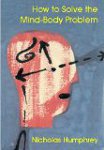 Nicholas Humphrey
Nicholas Humphrey
How to Solve the Mind-Body Problem
(Imprint 2000)
The mind is the brain. Each mental state – each hope, fear, thought – can be identified with a particular physical state of the brain, without remainder. So argues Nicholas Humphrey in this readable yet scholarly essay. He offers strong support for his identity theory from evolutionary psychology.
His claim is discussed and challenged in commentary papers by Andy Clark, Daniel Dennett, Naomi Eilan, Ralph Ellis, Valerie Gray Hardcastle, Stevan Harnad, Natika Newton, Christian de Quincey, Carol Rovane and Robert van Gulick. Humphrey rounds off the book with a response to his critics. See Imprint | Google
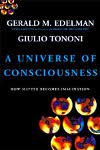 Gerald Edelman & Giulio Tononi
Gerald Edelman & Giulio Tononi
A Universe of Consciousness
(Basic Books 2000)
Building on the radical ideas introduced in his trilogy – Neural Darwinism (1987), Topobiology (1988), and The Remembered Present (1990) – Edelman presents an empirically supported theory of consciousness. With neurobiologist Giulio Tononi, he shows how we can identify the specific brain waves that correlate with particular conscious experiences. The results of this pioneering work challenge the conventional wisdom about consciousness. See Basic Books | Google
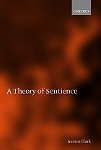 Austen Clark
Austen Clark
A Theory of Sentience
(Oxford 2000)
To sense something, one must have a capacity to discriminate among sensory qualities. But what other requirements are there and how can they be put together to yield full-blown sensing? Clark proposes that the various modalities of sensation share a generic form called 'feature-placing'. Sensing proceeds by picking out place-times in or around the body of the sentient organism, and characterizing qualities (features) that appear at those place-times. Such feature-placing is probably the most primitive kind of mental representation. Once its peculiarities have been described, many of the puzzles about the intentionality of sensation, and the phenomena that lead some to label it 'pseudo-intentional', can be resolved. See Oxford | Google | Amazon | Susanna Siegel review
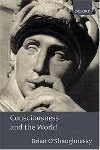 Brian O’Shaughnessy
Brian O’Shaughnessy
Consciousness and the World
(Oxford 2000)
O’Shaughnessy puts forward a bold and original theory of consciousness, one of the most fascinating but puzzling aspects of human existence. Whatever mystery there may be about the origins of consciousness, O’Shaughnessy suggests that there is no mystery about what it is. He proceeds to give a philosophical elucidation of its nature, analysing it into purely psychological constituents. It is his contention that consciousness consists in a closely knit complex of occurrent mental phenomena and powers with thinking and self-knowledge at the centre, and nothing else. See Oxford | Google | Amazon | Chapter 1 (pdf)
 Barry Stroud
Barry Stroud
The Quest for Reality: Subjectivism and the Metaphysics of Colour
(Oxford 2000)
Are the things we see around us really colored or do they only look that way because of the effects of light rays on our eyes and brains? Is color somehow “unreal” or “subjective” and dependent on our human perceptions and the conditions under which we see things? Stroud investigates these questions and asks what a person would have to do and believe in order to reach the conclusion that everyone’s perceptions and beliefs about the color of things are “illusions” and do not accurately represent the way things are in the world as it is independently of us. Arguing that no such conclusion could be consistently reached, Stroud finds that the conditions of a successful unmasking of color cannot all be fulfilled. See Oxford | Google | Amazon | Thomas Nagel review
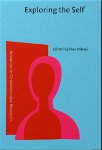 Dan Zahavi (ed.)
Dan Zahavi (ed.)
Exploring the Self: Philosophical and Psychopathological Perspectives on Self-Experience
(John Benjamins 2000)
This volume aims to discuss recent research into self-experience and its disorders and to better integrate different empirical and conceptual perspectives. Among the topics discussed are: What is a self?, What is the relation between the self-givenness of consciousness and the givenness of the conscious self?, How should we understand the self-disorders encountered in schizophrenia? and What general insights into the nature of the self can pathological phenomena provide us with? See John Benjamins | Google | Amazon
 Peter Carruthers
Peter Carruthers
Phenomenal Consciousness – A Naturalistic Theory
(Cambridge 2000)
Carruthers argues that the subjective feel of our experience is explicable in naturalistic (scientifically acceptable) terms. Drawing on a variety of interdisciplinary resources, he defends a novel account in terms of higher-order thought. He shows that this can explain away some of the more extravagant claims made about phenomenal consciousness while substantively explaining the key subjectivity of our experience. See Cambridge | Google | Amazon
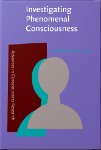 Max Velmans (ed.)
Max Velmans (ed.)
Investigating Phenomenal Consciousness
(John Benjamins 2000)
To investigate phenomenal consciousness, we need appropriate first-person, second-person and third-person methods. This book introduces some of the creative ways in which these methods can be applied to different purposes, e.g. to understanding the relation of consciousness to brain, to examining or changing consciousness as such, and to understanding the way consciousness is influenced by social, clinical and therapeutic contexts. See John Benjamins | Google | Amazon
 Max Velmans
Max Velmans
Understanding Consciousness
(Routledge 2000)
The mysteries of consciousness have gripped our imagination for over 2500 years. At the dawn of the millennium, Velmans provides solutions to some of its deepest puzzles. Challenging conventional reductionist thought, he provides an understanding of how consciousness relates to the brain and physical world that is neither dualist nor reductionist. See Routledge | Google | Amazon
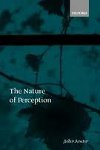 John Foster
John Foster
The Nature of Perception
(Oxford 2000)
What is it to perceive a physical object? Foster rejects the view that we perceive such objects directly and argues for a new version of the traditional empiricist account which locates the immediate objects of perception in the mind. But this account seems to imply that we do not perceive physical objects at all. Foster offers a surprising solution, which involves embracing an idealist view of the physical world. See Oxford | Google | Amazon | Tim Crane review (pdf)
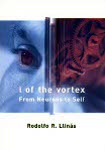 Rodolfo R. Llinás
Rodolfo R. Llinás
I of the Vortex: From Neurons to Self
(MIT 2000)
Llinás proposes that the “mindness state” evolved to allow predictive interactions between mobile creatures and their environment. To move through the environment safely, a creature must anticipate the outcome of each movement on the basis of incoming sensory data. Thus the capacity to predict is most likely the ultimate brain function. One could even say that self is the centralization of prediction. See MIT | Google
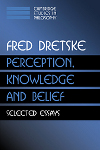 Fred Dretske
Fred Dretske
Perception, Knowledge and Belief: Selected Essays
(Cambridge 2000)
This collection of essays by Dretske brings together work on the theory of knowledge and philosophy of mind spanning 30 years. The two areas combine to lay the groundwork for a naturalistic philosophy of mind. The essays focus on perception, knowledge, and consciousness. Together, they show the interconnectedness of Dretske’s work in epistemology and his more contemporary ideas on philosophy of mind. See Cambridge | Amazon | Google
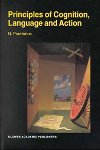 N. Praetorius
N. Praetorius
Principles of Cognition, Language and Action: Essays on the Foundations of a Science of Psychology
(Springer 2000)
This book exposes serious flaws in the reductionist assumptions about mind and matter, naturalism and constructivism, which underlie research on cognition, language and action within current academic psychology. The author argues for radically different assumptions about the relationship between mental and material reality, as the point of departure for all investigations into reality and our cognition and description of it. See Springer | Amazon | Google

The Tensed Theory of Time: A Critical Examination
(Kluwer 2000)
This book and its companion, The Tenseless Theory of Time, are an attempt to adjudicate what is possibly the most fundamental question in the philosophy of time, namely, whether a static or a dynamic conception of the world is correct. In these two complementary but independent volumes, Craig examines the most important arguments for and against each theory. See Springer | Amazon | Google

The Tenseless Theory of Time: A Critical Examination
(Kluwer 2000)
This book and its companion, The Tensed Theory of Time, are an attempt to adjudicate what is possibly the most fundamental question in the philosophy of time, namely, whether a static or a dynamic conception of the world is correct. In these two complementary but independent volumes, Craig examines the most important arguments for and against each theory. See Springer | Amazon | Google

Introducing Consciousness: A Graphic Guide
(Icon 2000)
A comprehensive guide to the current state of consciousness studies. It starts with the history of the philosophical relation between mind and matter, and proceeds to scientific attempts to explain consciousness in terms of neural mechanisms and quantum mechanics. Readers are also introduced to zombies and Chinese Rooms, ghosts in machines and Schrodinger’s cat. See Icon | Amazon | Google

Dreaming Souls: Sleep, Dreams, and the Evolution of the Conscious Mind
(Oxford 2000)
Flanagan argues that while sleep has a clear biological function and adaptive value, dreams are merely side effects, ‘free-riders,’ irrelevant from an evolutionary point of view. But dreams are hardly unimportant: they are self-expressive, the result of our need to find or create meaning, even when sleeping. Brainstem activity during sleep generates a jumbled profusion of memories, images, thoughts, emotions, and desires, which the cerebral cortex then attempts to shape into a more or less coherent story. However bizarre these narratives may be, they shed light on our mental life, our well being, and our sense of self. See Oxford | Amazon | Google

The Concept of Time in Psychology: A Resource Book and Annotated Bibliography
(Greenwood 2000)
The methodologies used to study psychological time, especially the experimental and empirical approaches, are critically important in the scientific analysis of the concept of time. This resource and annotated bibliography provides a current and comprehensive review of the literature on psychological time, and traces the evolution of the concept of time in psychology from ancient to modern periods. See Greenwood | Amazon | Google

Realism and Appearances: An Essay in Ontology
(Cambridge 2000)

This book addresses one of the fundamental topics in philosophy: the relation between appearance and reality. Yolton draws on a rich combination of historical and contemporary material, ranging from the early modern period to present-day debates, to examine this central philosophical preoccupation, which he presents in terms of distinctions between phenomena and causes, causes and meaning, and persons and man. See Cambridge | Amazon | Google

Color Perception: Philosophical, Psychological, Artistic, and Computational Perspectives
(Oxford 2000)

Color has been studied for centuries, but remains incompletely understood. The fact that color is a quality of perception rather than a "physical quality" brings up a host of interesting questions and makes it of common interest to both artists and scholars. This highly interdisciplinary volume - the ninth in the Vancouver Studies in Cognitive Science series - brings together chapters by psychologists, philosophers, computer scientists, and artists to explore the nature of human color perception, and hopes to further our understanding of color by encouraging interdisciplinary interaction. See Amazon | Google

The Emotions: A Philosophical Exploration
(Oxford 2000)
Goldie illuminates the phenomena of emotion by drawing on philosophy, literature and science. He considers the roles of culture and evolution in the development of our emotional capabilities, and examines their links to mood and character. He also places the emotions in the context of consciousness, thought, feeling, and imagination. He explains how we can make sense of our own and other people's emotions, and how we can explain the very human things which emotions lead us to do. See Oxford | Amazon | Google

Thinking Matter: Consciousness from Aristotle to Putnam and Sartre
(Routledge 2000)
While many contemporary philosophers downplay the significance of the body and subscribe to a brain/body dualism in consciousness, Catalano argues that it is the “entire” fleshy body that thinks; the body of the dancer and the hands of the writer are not merely instruments of thought, but forms of thought itself. Calling for a rethinking of philosophic traditions from Aristotle to Sartre, Catalano offers a holistic view of the bodily nature of consciousness, focusing on the total organic body than just the brain alone. See Routledge | Google

Stream of Consciousness
(Routledge 2000)

While the recent upsurge of interest in consciousness has focused on the relationship between consciousness and the brain, questions concerning the fundamental characteristics of consciousness itself have received less attention. Dainton presents a phenomenological inquiry into the most general features of conscious life: the nature of awareness, introspection, space and time-consciousness. He shows us that a stream of consciousness is not a mosiac of discrete fragments but an interconnected flowing whole. See Routledge | Google

The Private Life of the Brain
(Wiley 2000)
Greenfield examines the physical basis of our emotions and searches for the answer to one of the most enduring mysteries in science – how does the brain create a unique, subjective experience for each one of us? Utilizing cutting-edge research and compelling personal anecdotes, Greenfield reveals that emotions, triggered by individual life experiences, are the very foundation upon which our brains build our unique minds. See Wiley | Google | Amazon

History of the Mind-Body Problem
(Routledge 2000)

A collection of new essays on the various concerns that have given rise to and informed the mind-body problem in philosophy. The essays in this collection discuss famous philosophers such as Aristotle, Aquinas and Descartes and cover the subjects of the origins of qualia and intentionality. See Routledge | Google

Consciousness, Color and Content
(MIT 2000)

In 1995 Michael Tye proposed a theory of phenomenal consciousness now known as representationalism. This book is, in part, devoted to a further development of that theory along with replies to common objections. See MIT Press | Amazon | Google Books

Beyond Physicalism
(John Benjamins 2000)
Unlike standard attempts to address the problem of consciousness, which assume our understanding of consciousness is unproblematic, this book focuses on phenomenology and clarifies the relations between intentionality, propositional content and experience. It argues that consciousness cannot be understood in representationalist terms, and that the metaphysical problem is a product of the misguided attempt to fit consciousness within an object-based schema. A similar problem arises in the interpretation of quantum mechanics, giving us further reason to look beyond physicalism, in matters metaphysical. Thus the virtues of absolute idealism are re-examined. See John Benjamins | Google

How to Solve the Mind-Body Problem
(Imprint 2000)

The mind is the brain. Each mental state – each hope, fear, thought – can be identified with a particular physical state of the brain, without remainder. So argues Nicholas Humphrey in this readable yet scholarly essay. He offers strong support for his identity theory from evolutionary psychology.
His claim is discussed and challenged in commentary papers by Andy Clark, Daniel Dennett, Naomi Eilan, Ralph Ellis, Valerie Gray Hardcastle, Stevan Harnad, Natika Newton, Christian de Quincey, Carol Rovane and Robert van Gulick. Humphrey rounds off the book with a response to his critics. See Imprint | Google

A Universe of Consciousness
(Basic Books 2000)
Building on the radical ideas introduced in his trilogy – Neural Darwinism (1987), Topobiology (1988), and The Remembered Present (1990) – Edelman presents an empirically supported theory of consciousness. With neurobiologist Giulio Tononi, he shows how we can identify the specific brain waves that correlate with particular conscious experiences. The results of this pioneering work challenge the conventional wisdom about consciousness. See Basic Books | Google

A Theory of Sentience
(Oxford 2000)

To sense something, one must have a capacity to discriminate among sensory qualities. But what other requirements are there and how can they be put together to yield full-blown sensing? Clark proposes that the various modalities of sensation share a generic form called 'feature-placing'. Sensing proceeds by picking out place-times in or around the body of the sentient organism, and characterizing qualities (features) that appear at those place-times. Such feature-placing is probably the most primitive kind of mental representation. Once its peculiarities have been described, many of the puzzles about the intentionality of sensation, and the phenomena that lead some to label it 'pseudo-intentional', can be resolved. See Oxford | Google | Amazon | Susanna Siegel review

Consciousness and the World
(Oxford 2000)
O’Shaughnessy puts forward a bold and original theory of consciousness, one of the most fascinating but puzzling aspects of human existence. Whatever mystery there may be about the origins of consciousness, O’Shaughnessy suggests that there is no mystery about what it is. He proceeds to give a philosophical elucidation of its nature, analysing it into purely psychological constituents. It is his contention that consciousness consists in a closely knit complex of occurrent mental phenomena and powers with thinking and self-knowledge at the centre, and nothing else. See Oxford | Google | Amazon | Chapter 1 (pdf)

The Quest for Reality: Subjectivism and the Metaphysics of Colour
(Oxford 2000)

Are the things we see around us really colored or do they only look that way because of the effects of light rays on our eyes and brains? Is color somehow “unreal” or “subjective” and dependent on our human perceptions and the conditions under which we see things? Stroud investigates these questions and asks what a person would have to do and believe in order to reach the conclusion that everyone’s perceptions and beliefs about the color of things are “illusions” and do not accurately represent the way things are in the world as it is independently of us. Arguing that no such conclusion could be consistently reached, Stroud finds that the conditions of a successful unmasking of color cannot all be fulfilled. See Oxford | Google | Amazon | Thomas Nagel review

Exploring the Self: Philosophical and Psychopathological Perspectives on Self-Experience
(John Benjamins 2000)
This volume aims to discuss recent research into self-experience and its disorders and to better integrate different empirical and conceptual perspectives. Among the topics discussed are: What is a self?, What is the relation between the self-givenness of consciousness and the givenness of the conscious self?, How should we understand the self-disorders encountered in schizophrenia? and What general insights into the nature of the self can pathological phenomena provide us with? See John Benjamins | Google | Amazon

Phenomenal Consciousness – A Naturalistic Theory
(Cambridge 2000)

Carruthers argues that the subjective feel of our experience is explicable in naturalistic (scientifically acceptable) terms. Drawing on a variety of interdisciplinary resources, he defends a novel account in terms of higher-order thought. He shows that this can explain away some of the more extravagant claims made about phenomenal consciousness while substantively explaining the key subjectivity of our experience. See Cambridge | Google | Amazon

Investigating Phenomenal Consciousness
(John Benjamins 2000)
To investigate phenomenal consciousness, we need appropriate first-person, second-person and third-person methods. This book introduces some of the creative ways in which these methods can be applied to different purposes, e.g. to understanding the relation of consciousness to brain, to examining or changing consciousness as such, and to understanding the way consciousness is influenced by social, clinical and therapeutic contexts. See John Benjamins | Google | Amazon

Understanding Consciousness
(Routledge 2000)

The mysteries of consciousness have gripped our imagination for over 2500 years. At the dawn of the millennium, Velmans provides solutions to some of its deepest puzzles. Challenging conventional reductionist thought, he provides an understanding of how consciousness relates to the brain and physical world that is neither dualist nor reductionist. See Routledge | Google | Amazon

The Nature of Perception
(Oxford 2000)

What is it to perceive a physical object? Foster rejects the view that we perceive such objects directly and argues for a new version of the traditional empiricist account which locates the immediate objects of perception in the mind. But this account seems to imply that we do not perceive physical objects at all. Foster offers a surprising solution, which involves embracing an idealist view of the physical world. See Oxford | Google | Amazon | Tim Crane review (pdf)

I of the Vortex: From Neurons to Self
(MIT 2000)

Llinás proposes that the “mindness state” evolved to allow predictive interactions between mobile creatures and their environment. To move through the environment safely, a creature must anticipate the outcome of each movement on the basis of incoming sensory data. Thus the capacity to predict is most likely the ultimate brain function. One could even say that self is the centralization of prediction. See MIT | Google

Perception, Knowledge and Belief: Selected Essays
(Cambridge 2000)

This collection of essays by Dretske brings together work on the theory of knowledge and philosophy of mind spanning 30 years. The two areas combine to lay the groundwork for a naturalistic philosophy of mind. The essays focus on perception, knowledge, and consciousness. Together, they show the interconnectedness of Dretske’s work in epistemology and his more contemporary ideas on philosophy of mind. See Cambridge | Amazon | Google

Principles of Cognition, Language and Action: Essays on the Foundations of a Science of Psychology
(Springer 2000)
This book exposes serious flaws in the reductionist assumptions about mind and matter, naturalism and constructivism, which underlie research on cognition, language and action within current academic psychology. The author argues for radically different assumptions about the relationship between mental and material reality, as the point of departure for all investigations into reality and our cognition and description of it. See Springer | Amazon | Google
Menu
 What’s a logical paradox?
What’s a logical paradox? Achilles & the tortoise
Achilles & the tortoise The surprise exam
The surprise exam Newcomb’s problem
Newcomb’s problem Newcomb’s problem (sassy version)
Newcomb’s problem (sassy version) Seeing and being
Seeing and being Logic test!
Logic test! Philosophers say the strangest things
Philosophers say the strangest things Favourite puzzles
Favourite puzzles Books on consciousness
Books on consciousness Philosophy videos
Philosophy videos Phinteresting
Phinteresting Philosopher biographies
Philosopher biographies Philosopher birthdays
Philosopher birthdays Draft
Draftbarang 2009-2024  wayback machine
wayback machine
 wayback machine
wayback machine